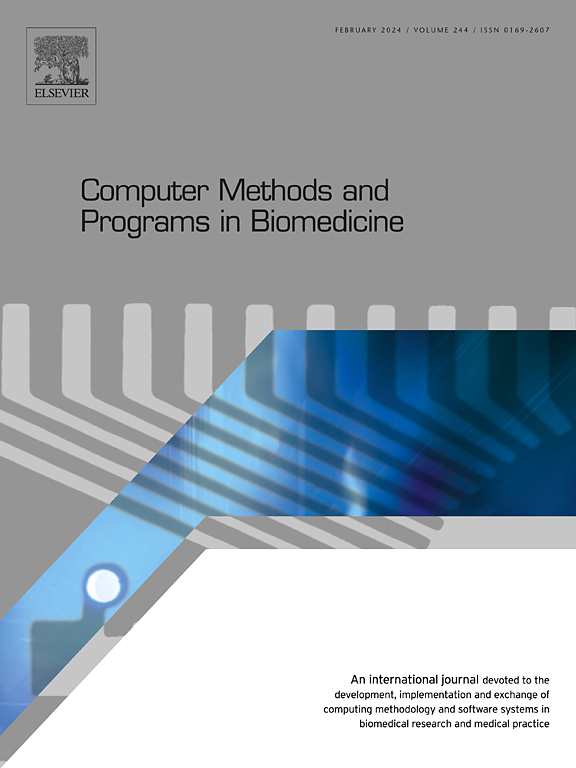PCSCN:用于大规模心音图数据清理和增强的质量评估模型
IF 4.8
2区 医学
Q1 COMPUTER SCIENCE, INTERDISCIPLINARY APPLICATIONS
引用次数: 0
摘要
背景:大规模心音图(PCG)数据的获取对临床研究至关重要,并显著推进了数据驱动的心音分类模型的应用。由于临床环境的复杂性,所采集的PCG数据的质量无法保证。排除低质量信号对于进行可靠的PCG分析至关重要。方法:本研究引入一种新的质量评估模型——并行通道序列卷积网络(PCSCN)。PCSCN能够自动准确地检测和去除低质量的PCG信号,从而提高数据集的可靠性和可用性。与以往依赖于手动提取大量统计特征的方法不同,PCSCN采用低复杂度特征和多通道序列架构,提供更高的准确性和效率。此外,本研究将PCSCN应用于数据库清洗和增强的对照实验中,验证该过程对下游数据驱动的PCG分类模型的影响。结果:在公共数据集上进行测试时,PCSCN的准确率为95.45%,f1得分为95.44%。在涉及7220名受试者的PCG数据的数据库清理任务中,PCSCN在515.76秒内完成任务。此外,在对照实验中,使用pcscn增强数据训练的PCG分类模型在多个指标上表现出更高的性能。结论:PCSCN可靠、高效,有望在大规模PCG数据库的清洗中发挥关键作用。PCSCN通过增强和提高训练数据的质量,显著增强了PCG分类模型的临床决策能力,从而提升了其临床研究和应用价值。本文章由计算机程序翻译,如有差异,请以英文原文为准。
PCSCN: A quality assessment model for large-scale phonocardiogram data cleaning and enhancement
Background:
The acquisition of large-scale phonocardiogram (PCG) data is crucial for clinical research and has significantly advanced the application of data-driven heart sound classification models. Owing to the complexity of clinical environments, the quality of collected PCG data cannot be guaranteed. The exclusion of low-quality signals is essential for conducting a reliable PCG analysis.
Methods:
This study introduces a novel quality assessment model, the Parallel Channel Sequence Convolutional Network (PCSCN). The PCSCN automatically and accurately detects and removes low-quality PCG signals, thereby improving dataset reliability and usability. Unlike previous methods that rely on manually extracting numerous statistical features, the PCSCN employs low-complexity features and a multi-channel sequence architecture, offering greater accuracy and efficiency. In addition, this study applies the PCSCN in a controlled experiment for database cleaning and enhancement to verify the impact of this process on downstream data-driven PCG classification models.
Results:
When tested on a public dataset, PCSCN achieved an accuracy of 95.45% and an F1-score of 95.44%. In a database cleaning task involving PCG data from 7220 subjects, PCSCN completed the task in 515.76s. Furthermore, in the controlled experiment, the PCG classification model trained with PCSCN-enhanced data demonstrated enhanced performance across multiple metrics.
Conclusions:
The PCSCN is both reliable and efficient, and is poised to play a pivotal role in the cleaning of large-scale PCG databases. By enhancing and improving the quality of the training data, the PCSCN significantly strengthens the clinical decision-making capabilities of PCG classification models, thereby elevating their value for clinical research and application.
求助全文
通过发布文献求助,成功后即可免费获取论文全文。
去求助
来源期刊

Computer methods and programs in biomedicine
工程技术-工程:生物医学
CiteScore
12.30
自引率
6.60%
发文量
601
审稿时长
135 days
期刊介绍:
To encourage the development of formal computing methods, and their application in biomedical research and medical practice, by illustration of fundamental principles in biomedical informatics research; to stimulate basic research into application software design; to report the state of research of biomedical information processing projects; to report new computer methodologies applied in biomedical areas; the eventual distribution of demonstrable software to avoid duplication of effort; to provide a forum for discussion and improvement of existing software; to optimize contact between national organizations and regional user groups by promoting an international exchange of information on formal methods, standards and software in biomedicine.
Computer Methods and Programs in Biomedicine covers computing methodology and software systems derived from computing science for implementation in all aspects of biomedical research and medical practice. It is designed to serve: biochemists; biologists; geneticists; immunologists; neuroscientists; pharmacologists; toxicologists; clinicians; epidemiologists; psychiatrists; psychologists; cardiologists; chemists; (radio)physicists; computer scientists; programmers and systems analysts; biomedical, clinical, electrical and other engineers; teachers of medical informatics and users of educational software.
 求助内容:
求助内容: 应助结果提醒方式:
应助结果提醒方式:


